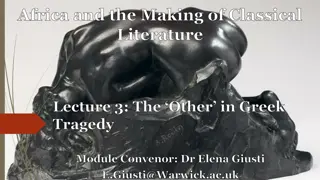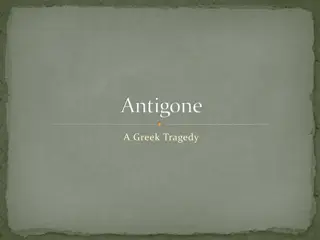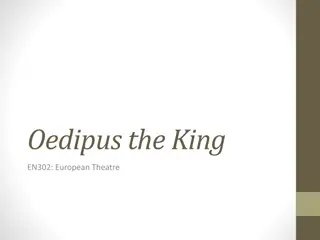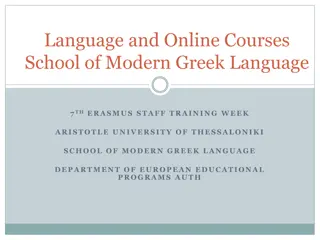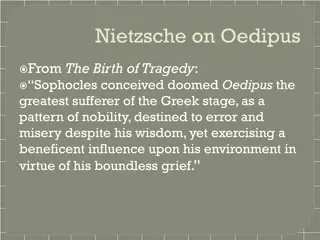Greek Tragedy: From Oedipus Rex to Sophocles' Legacy
Greek tragedy, rooted in societal changes of Greek culture, explores the arrogance of tragic protagonists like Oedipus. The form and structure of tragedies aim to evoke catharsis in audiences through a journey of fear and emotions. Playwrights like Aeschylus, Euripides, and Sophocles contributed distinct perspectives on human folly, fate, and the role of gods in dramatic storytelling. These tragedies, often based on myths or historical events, continue to influence literature and entertainment.
Download Presentation

Please find below an Image/Link to download the presentation.
The content on the website is provided AS IS for your information and personal use only. It may not be sold, licensed, or shared on other websites without obtaining consent from the author. Download presentation by click this link. If you encounter any issues during the download, it is possible that the publisher has removed the file from their server.
E N D
Presentation Transcript
OEDIPUS REX By Sophocles
TRAGEDY NOTES Tragedy Derived from Greek words tragos and ode---told a story to teach religious lessons Designed to show the right and wrong paths in life Not simply plays with bad endings, they depicted the life voyages of people who steered themselves on a collision course with society, life s rules, or fate. Tragic Protagonist One who refuses to acquiesce to fate or life s rules Main fault is hubris (arrogance) Whatever reason, the fate of protagonist is inevitable and irrevocable
CULTURE THAT CREATED TRAGEDY Tragedy was an outgrowth of what was happening in society Greek religions had dictated how people should think and behave for centuries During 4th and 5th centuries BC, a flourishing of free thought and intellectual inquiry occurred Ideas-democracy, philosophy, math, science and art Philosophers-Plato, Socrates, Aristotle Renaissance England resembles Athens in respects of blossoming of free thought after years of religious dicta which occurred in both countries *Shakespeare and Marlow Athenians began to question nature, society and man s role in world. Tragedy was poet s answer.
THE TRAGEDY FORM Prologue-describes the situation and scene Parados-ode sung by chorus as it enters Five dramatic scenes- each followed by a Komos-an exchange of laments by the chorus and protagonists Exodus-the climax and conclusion Often presented in trilogies Oedipus Rex, Antigone, and Oedipus at Colonus Purpose-to arouse in the audience fear and emotions, and by doing so, purge the audience of those feelings-catharsis
GREEK PLAY WRIGHTS Aeschylus 484 BC-1st playwright-wrote earliest play in existence (472 BC) Euripides-5th Century BC-plays not about gods or royalty but real people **Sophocles *Born in 496 BC died after 413 BC Wrote 123 plays during his lifetime; only 7 survive in full Contribution to drama was the addition of a third actor and emphasis on a drama between humans rather than humans and gods Plays are suffused with irony Plays are about the folly of arrogance and the wisdom of accepting fate
MYTHOLOGICAL AND HISTORICAL INFLUENCE Greek tragedies were based on widely-known myths or famous historical events, so the audience would know the characters and outline of the story they were about to see. Seeing a play about Oedipus, for instance, Sophocles Athenian audience would already know that this story came from the cycle of myths about the city of Thebes, one of Athens rivals in the 5th century. Most surprises did not come from the plot, but from the new way the playwright used familiar material. Because Sophocles audience was already familiar with this information, he does not need to explain events that happened prior to the story, but simply allude to it.
OEDIPUS BACKGROUND SPOILER ALERT The Oedipus story is set a few generations before the Trojan War, which the ancient Greeks placed in 1184 BCE. King Laius of Thebes received a prophecy that his son would kill him. To avoid the outcome of the prophecy, Laius had his baby exposed (abandoned without protection from the elements a common way to get rid of unwanted infants) on Mount Cithaeron, one of the most remote points of his kingdom. As an extra precaution, he nailed the child s feet together. Unfortunately for Laius, the baby survived and was raised as a prince of the city of Corinth. He was named Oedipus, which means swollen feet in Greek. Many years later, Oedipus, not knowing his true birth, met Laius on the road and killed him.
THE RIDDLE OF THE SPHINX At the time, Thebes was being terrorized by a monster with the head of a woman, body of a lion, and wings of an eagle called the Sphinx. She was particularly famous for telling everyone she encountered a riddle: What walks on four legs in the morning, two legs in the afternoon, and three legs in the evening? Men who answered incorrectly were devoured.
Oedipus answered the challenge correctly. What is the answer? Her riddle solved, the Sphinx threw herself from a cliff, and Oedipus was crowned king of Thebes. Oedipus married the recently widowed queen, Jocasta. He did not know his real relationship to the man he killed and the woman he married.
OEDIPUS COMPLEX NOUN psychoanalysis 1.(in Freudian theory) the complex of emotions aroused in a young child, typically around the age of four, by an unconscious sexual desire for the parent of the opposite sex and wish to exclude the parent of the same sex. (The term was originally applied to boys, the equivalent in girls being called the Electra complex.). Sigmund Freud developed this theory and took its name from the Greek tragedy
TERMS/IDEALS TO KNOW Chorus-- in Greek means dance, and the chorus main function was to sing and dance lyric odes in between dramatic episodes. Daimones-- divine forces, not quite gods, who could influence human life and events. They acted somewhat like guardian angels, but could also be malicious. The word demons comes directly from the Greek word daimones. Hybris--the great philosopher Aristotle, who lived in Athens in the century after Sophocles death, defined hybris as physical or verbal assault that brings shame to the victim, but no reward to the agent other than the personal satisfaction received from inflicting disgrace on another. Aristotle associates the act of hybris with the state of anger. (It is important to note that hybris is the act of violence itself; modern readers often make the mistake of thinking of it as some kind of attitude or pride (Hubris). Sometimes they are intertwined. physical or verbal;
Oracles-- In order to understand the will of the gods, the Greeks consulted oracles. These were places holy to a specific deity (often Apollo); humans could pose questions and the god would answer through a chosen intermediary. The most important oracle in the Greek world was Apollo s temple at Delphi (also called Pytho, because legend said that it was founded when Apollo killed the previous resident, a giant snake, or python.). Here, Apollo answered questions through his priestess, the Pythia, who entered an ecstatic state and babbled out responses, which were in turn interpreted and delivered in verse by the priests. It was customary for kings and cities to consult the oracle of Delphi before making any big decision. Pollution (miasma)--Murder and incest violate natural law as well as human law, so these crimes were seen to offend the gods. Both the agent and location of the crime were polluted by the act, as were people or places harboring the polluted individual; proper ritual cleansing (catharsis) was necessary to restore both person and place to an acceptable state. In the presence of pollution, sacrifices and prayers would be ignored by the gods, who were offended by the pollution. Hence, the community had to become involved just one polluted person could destroy an entire city, which is the case in the beginning of the Oedipus Rex, when the presence of Laius uncleansed murderer brings a plague upon Thebes. Apollo s oracle tells the Thebans to either kill or drive out the guilty man, which will remove the source of pollution from Thebes. Assuming that the guilty man left Thebes for voluntary exile, he could approach a temple or powerful person and ask for ritual cleansing, at which point he would not longer be considered polluted or bring pollution upon his location.
Religion For the most part, Greek religion did not follow a moral code. The Greeks did not love their gods, but respected their power. Humans won the favor of the gods through sacrifice and offerings, whether blood sacrifice of an animal (the kind of animal would be determined by tradition and the means of the sacrificer); pouring out a liquid offering (libation) of milk, wine, or honey; placing a gift of flowers or incense by the statue of a god; or dedicating an object of value in a temple. In return for such gifts, the gods would heed one s prayers. Since crimes like homicide or incest offended the gods (see pollution ), they threatened the effectiveness of the prayers and sacrifices of the entire community, so the entire community could become involved in punishing those crimes. Suppliant-- anyone who makes a request or prayer from a position of powerlessness. In Greek culture, the suppliant was a sacred position with special rights, responsibilities, and visual symbols. Suppliants wore or carried special emblems, such as olive branches, to identify themselves. Traditionally, they knelt before the person they were supplicating and touched either his knees or chin (it was thought that the knees and chin were directly connected to a person s heart). Suppliants also took refuge at altars. It was taboo to harm a suppliant, and anyone who did so would be cursed. Tyche--Chance. This force was personified by the Greeks as a fickle goddess. Tyche governed coincidences, simple mistakes, and luck, whether good or bad. When Oedipus declares himself a child of Chance, he does not seriously mean that this goddess is his mother, but that his life has been dominated by fortune, as he is a foundling who became a king. Thebes--One of the major cities in Greece (one of Athens rivals in Sophocles time) and the scene of the action of the Oedipus Rex Tyrannus-- Oedipus Rex is the Latin title of a play that was called Oedipus Tyrannus in Greek. The English translation is Oedipus the King.

















